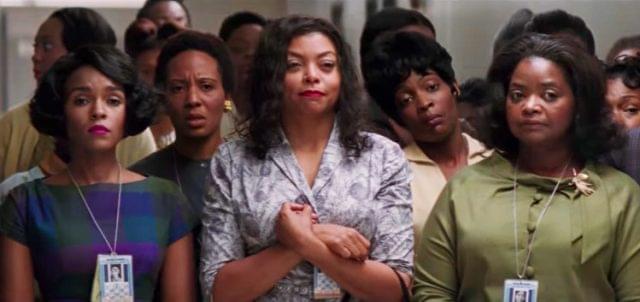
“Hidden Figures” belongs to the feel-good section of Films About Racism, the kind where racism is a problem that can be handled incrementally, with many small victories and bursts of happiness along the way. The violent confrontations and overt hatred that marked many aspects of the Civil Rights movement aren’t at play here; instead, it’s the ennobling true story of the black women at NASA who helped put white men into space.
The hopeful, this-is-serious-but-it’s-going-to-be-OK tone is set early on. Three black women, all math whizzes — mousy genius Katherine Johnson (Taraji P. Henson), fiery Mary Jackson (Janelle Monae), and matronly Dorothy Vaughan (Octavia Spencer) — have car trouble on their way to work at NASA headquarters in Langley, Va., in 1961, drawing the attention of a good ol’ boy cop. As he moseys over to their vehicle, we brace ourselves for a heapin’ helpin’ of harassment. The cop starts to deliver it, too — until he learns they work at NASA. Then his patriotism overrides his racism and he gives them a police escort to work so they won’t be late. Not a moment to lose in the race to beat the Russians!
Our trio of friends are computers, a term that in 1961 still referred to humans who add numbers. At NASA, they work in a room designated “colored computers,” in a separate building from where the white nerds in skinny neckties work. But none of those white nerds understand analytic geometry (HA HA, DUMMIES!), so the head of their program, Al Harrison (Kevin Costner), goes looking for someone who does. Katherine fits the bill (she’s the only one), so she’s brought over, making her the only non-white person in that department. She still has to run back to her old building to use the bathroom, though, as there are no “colored” restrooms in this one. (The way the film ties up this particular thread is priceless.)
The reactions of Katherine’s new co-workers to her presence range from hostile to indifferent, amusingly petty to devastating. One jerk, Stafford (Jim Parsons), refuses to acknowledge her expertise, or even her competence, in anything math-related, setting the stage for either a touching change of heart or a righteous comeuppance. Their boss, Harrison, is racist the way many of his contemporaries were, conditioned not by malice but tradition. His biggest concern is not letting the Russians get to space before we do. If that means working with a black lady, so be it.
Back in the other part of the NASA campus, Mary and Dorothy are forging their own paths. Mary is working with engineers and is knowledgeable enough to be one but lacks the formal training … and can’t get it, since the only local school offering the necessary courses won’t admit blacks. Dorothy, meanwhile, is doing the work of a supervisor, but can’t get her prissy, bleary-eyed white boss (Kirsten Dunst) to give her the appropriate pay raise. When Dorothy sees massive new International Business Machines being moved in, hinting that her entire department may soon be obsolete, she starts reading up on Fortran. (She swipes the book from the public library while being kicked out for being black.)
All three women reflect, to varying degrees, the pragmatic attitude of many minorities of the era, swallowing their anger in the face of day-to-day indignities to focus on the bigger picture. Not one of them simply accepts her secondary status, but each fights it differently. Katherine lets her gentle personality and undeniable brilliance speak for her; Mary files petitions and isn’t afraid to speak up to a loudmouth (and has a husband who’d like her to be more militant); Dorothy thinks in practical terms and gets to work quietly training herself to be the best she can be.
The director, Theodore Melfi (“St. Vincent”), wrote the screenplay with Allison Schroeder, adapting Margot Lee Shetterly’s nonfiction bestseller. Aiming not to make us feel bad about racism (that’s a given) but hopeful about overcoming it and proud of the legitimate advancements we’ve made, Melfi tells the story with cheerful positivity but not too much flippancy. It’s satisfying in the classic Hollywood style, with little triumphs dotting the long road toward equality — little triumphs like hero astronaut John Glenn (Glen Powell) refusing to get into the space capsule until Katherine herself confirms that the calculations are correct (which is evidently true). The film’s light, breezy entertainment value hides a deeper poignance, making it a nice complement to the heavier films that take the opposite approach.
B+ (2 hrs., 6 min.; )





